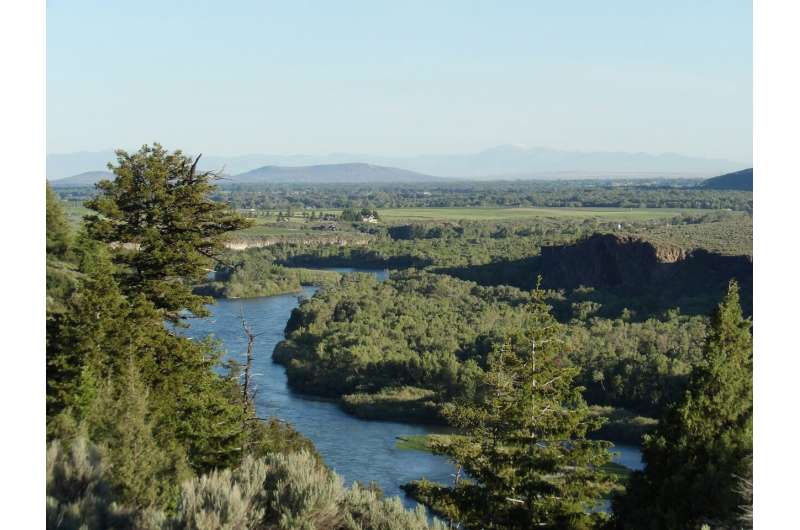Science
Idaho’s Mussel Eradication Plan Risks Killing Native Species

Efforts to eradicate invasive mussels in Idaho’s Snake River may inadvertently threaten native animal species. A recent study published in Environmental Toxicology and Chemistry highlights the potential ecological fallout from the state’s decision to treat the river with a copper-based molluscicide. This action comes in response to the detection of larval and adult quagga mussels near Twin Falls, marking the first occurrence of these invasive species in the Columbia River Basin.
Dreissenid mussels, which include zebra and quagga mussels, have wreaked havoc on freshwater ecosystems since their introduction to the United States in the late 1980s. Initially discovered in the Great Lakes, these invasive mollusks have spread throughout eastern and central U.S. waters, causing significant ecological and economic damage. The costs of managing their impact from 1989 to 2004 were estimated at $267 million for water treatment and electrical plants.
In a bid to prevent further spread, Idaho’s eradication plan involved the application of approximately 46,000 gallons of a copper-based molluscicide, containing 28.2% copper ethanolamine and 9.1% metallic copper, over a period of ten days. While such treatments are common in smaller bodies of water, their use in large rivers raises concerns about unintended consequences.
Research Findings on Ecological Impact
Researchers assessed the effects of this copper treatment on the benthic community in the Snake River. They collected water samples from seven locations throughout the treatment period. The findings revealed that nearly half of the original copper mass dissipated by the end of the observation period. However, dissolved copper levels remained above toxic thresholds for over two weeks after the treatment commenced.
The study found a drastic decline in animal abundance, with reductions ranging from 54% to 94% at the monitored sites. Various species, such as water nymph worms, flatworms, midge flies, freshwater shrimp, and pebblesnails, experienced significant population drops. Alarmingly, some species, including the New Zealand mud snail, the gyro snail, and the tadpole snail, vanished entirely from the river.
While a few new organisms appeared post-treatment, such as sludge worms and seed shrimp, the overall shift in animal diversity poses serious risks. The copper’s effects extended almost 40 miles downstream, potentially impacting federally protected species in the region, including various threatened and endangered fish.
The implications of this research are crucial for decision-makers. The decline in native animal populations could disrupt food chains and habitats, threatening the ecological balance in the Snake River and surrounding areas. As Idaho continues to grapple with invasive species management, the findings of this study underscore the need for a careful assessment of the ecological impacts of eradication efforts.
For more details, refer to the study titled “Fate and effects to the benthic community of a copper treatment to eradicate invasive mussels in a large western river, USA,” published in Environmental Toxicology and Chemistry in March 2025.
-

 World3 days ago
World3 days agoCoronation Street’s Shocking Murder Twist Reveals Family Secrets
-

 Entertainment4 months ago
Entertainment4 months agoKate Garraway Sells £2 Million Home Amid Financial Struggles
-

 Entertainment3 months ago
Entertainment3 months agoAnn Ming Reflects on ITV’s ‘I Fought the Law’ Drama
-

 Health3 months ago
Health3 months agoKatie Price Faces New Health Concerns After Cancer Symptoms Resurface
-

 Entertainment3 weeks ago
Entertainment3 weeks agoCoronation Street Fans React as Todd Faces Heartbreaking Choice
-

 World4 weeks ago
World4 weeks agoBailey Announces Heartbreaking Split from Rebecca After Reunion
-

 Entertainment6 days ago
Entertainment6 days agoTwo Stars Evicted from I’m A Celebrity Just Days Before Finale
-

 World6 days ago
World6 days agoKevin Sinfield Exceeds Fundraising Goal Ahead of Final Marathons
-

 Entertainment3 months ago
Entertainment3 months agoCoronation Street’s Carl Webster Faces Trouble with New Affairs
-

 Entertainment3 months ago
Entertainment3 months agoWhere is Tinder Swindler Simon Leviev? Latest Updates Revealed
-

 Entertainment4 months ago
Entertainment4 months agoMarkiplier Addresses AI Controversy During Livestream Response
-

 Science2 months ago
Science2 months agoBrian Cox Addresses Claims of Alien Probe in 3I/ATLAS Discovery





















